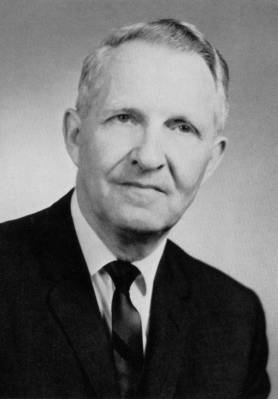Principal John J. Goldgruber
Oral Interview (1979)

Clips from the Goldgruber oral interview (1979):
-
"We had noise in our classrooms; we had some vandalism at times. But, ... nobody would take advantage of Miss Weber!
Nobody would take advantage of Miss Weigthman!"
"The program for each individual, except probably the 7th and 8th grade, was determined by the student's advisor,
and the parent. ...
And this student kept the same counselor or advisor for the full term, until he graduated."
"We had more student teachers at one time — in the building — during the day, than we had students.
And this came right after the war. ... And that, I think, brought about the rethinking of student teaching ... from a one-hour per day to a block semester or an internship of one semester."
"Many of our teachers spent much more time [at school] than they were expected.
But, our building was open most of the time. ... the building was open, too much so."
"I think Wisconsin High had very little impact serving as a model to other schools.
There was no other school that was like it. ...
I think it was a model to the student teachers who came to it."
"I think Wisconsin High School for its size had unusual staff and a very unusual program.
We offered Russian history, we offered Russian language, we offered French, Spanish, German and Latin. ...
We offered an integrated arts program for the 7th and 8th grade that included home-ec, industrial arts, music, and fine arts. ...
In addition to that, we had an integrated arts program at the senior level."
"We recognized that we were not providing a good experience for our student teachers when the Ometra [?] program came into being
and this program went onto the block system which we all recognized was a much better system than
... coming to the school for a one-hour period. ...
Going on to a block semester and going onto a internship program was a realistic thing to do."